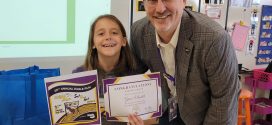April is Community College Month
Physics professor Monroe Kennedy spent his college days feeling different. Now he’s teaching his students to use their differences to stand up and stand out.
His office window faces the north and on early mornings in the summer, the sun shines through the glass and casts light on a single white flower in a vase on his desk. Thousands of tiny white flower clusters surround one that is distinct.
The flower is Queen Anne’s Lace.
“I like Queen Anne’s Lace,” says Monroe Kennedy. “Because there’s a flower in the middle that is different. But it is not put on the perimeter, it’s put on center stage. And so, if you’re in an environment where you feel different, it’s an opportunity for you to shine.”
Monroe Kennedy, Ph.D., is an associate professor of physics at Lorain County Community College. He was a 2023 honoree of the LCCC Foundation Faculty Excellence award.
“When I was a physics student at Case Western Reserve University, I was the only African American student in the physics department the entire time I was an undergrad. I felt the pressure of having to represent not only myself and my family but my race.”
Monroe grew up on Cleveland’s East side, the oldest son of four boys. Both his parents were teachers. His dad taught industrial arts to middle schoolers and his mother was an elementary school teacher.
“Being that one flower in the middle that is different than all the others; on one hand, some may not understand why it’s a lot of pressure until the situation is reversed,” he said. “If they are immersed in another culture where no one looks like them, then you begin to feel it.”
Kennedy sits in his physics lab on campus at LCCC as he talks. He speaks with his hands and reaches out with his left hand to make a point. On that hand is his wedding ring. Monroe and his wife, Karen, have been married for 34 years. They met on the CWRU campus and have four children. Karen is a physicist and an electrical engineer. Their oldest son is a mechanical engineering professor at Stanford University and the other is working on his Ph.D. in mechanical engineering. One daughter has a degree in computer science and the other is in college.
The classroom is empty. His students are gone for the day, but his mind is still in motion. He’s asked what he hopes his students take from his class.
“They need to be critical thinkers,” is his immediate answer. “As a critical thinker, you want to look at the evidence and make your own decision based on that evidence. I hope they understand that the universe is orderly and that things make sense. We just need to learn the rules.” At that, he laughs.
Monroe played offensive and defensive line for the football team at John Marshall High School as a freshman, sophomore and junior. The summer before his senior year, he attended the CWRU Minority Engineering Opportunity and Industrial Program. It changed his life.
“I had my ah-ha physics moment that summer in that program,” he said.
He stopped playing football, dedicated his time to science, graduated from John Marshall in the spring of 1986, and went on to earn three degrees from CWRU.
Monroe is nearing his 30th year in education and his 7th year as associate professor of physics at LCCC.
“My goal is to let students know that I am a colleague,” he said. “As they are working their way through an experiment that I have presented, I share with them if you can come up with a better way to do it let me know, I’ll institute it and give you extra credit.”
And, that has happened.
“That’s why I am here,” he said as his hands press down on the table in front of him. “I let the students know that their success is tantamount. You should not go out that door with a question that is unanswered.”
He’s asked one last question. What do you want to know?
Monroe crosses his arms and leans back in his chair.
“I’m worried about the advancement of technology,” he said. “What I would like to know is how to protect the vulnerable from being exploited from technological advances and their misuse.”
One more last question. Can you do that with physics?
“I don’t know,” he said. “But, it’s on my mind.”
The vulnerable. Like the lonely flower surrounded in the Queen Anne’s Lace.
“I always keep one in my office,” he said. “Just as a reminder.”
 The Villager Newspaper Online Your Community News – Cleveland's Westshore
The Villager Newspaper Online Your Community News – Cleveland's Westshore








